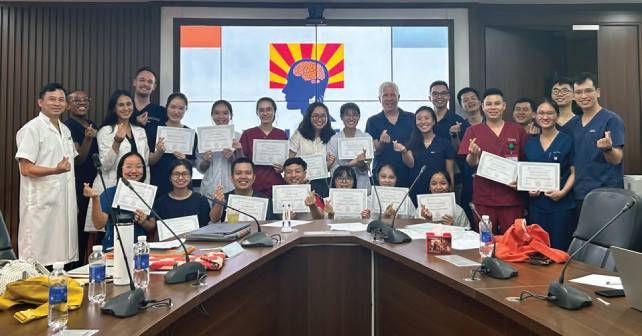
In the bustling streets of Vietnam, motorcycles remain the predominant mode of transportation. Navigating through Hanoi’s vibrant traffic, unhelmeted riders and close call accidents are all too common. Despite the implementation of a mandatory helmet law in 2007, road traffic collisions continue to be a significant contributor to traumatic brain injuries (TBI) and are the leading cause of both fatal and nonfatal injuries.1,2 To address this issue, a team of global health professionals endeavored to enhance the management of TBI patients in Vietnam. Their initiative not only aimed to elevate the standard of care for the emergent management of TBI in Vietnam, but also served as a model of excellence for global health interventions worldwide.
Explore This Issue
ACEP Now: Vol 43 – No 07 – July 2024Central to this initiative is a comprehensive training protocol, the EPIC (Excellence in Prehospital Injury Care) Traumatic Brain Injury Project, which has demonstrated a significant improvement in TBI outcomes.3 In the United States, the EPIC protocol has effectively promoted evidence-based standards for TBI treatment, emphasizing stabilization for optimized neurological outcomes. The EPIC-TBI training protocol, historically used to train EMS crews, proved to be simple, effective, and adaptable for low-resource settings, making it suitable for international use.

Physicians from the UT Health Houston Department of Emergency Medicine and Hanoi Medical University collaborated to introduce an EPIC-TBI training course.
Physicians from the UT Health Houston Department of Emergency Medicine and Hanoi Medical University collaborated to introduce an EPIC-TBI training course tailored for health care workers in the Hanoi region, including nurses, emergency medicine physicians, and trauma surgeons. Through a blend of didactic sessions, hands-on workshops, and simulated and case-based scenarios, participants were equipped to recognize TBI, assess its severity, and initiate timely interventions. To ensure sustainability and broad impact, the UT Health Houston team employed a train-the-trainer model, imparting specialized knowledge and skills to a select group of emergency medicine physicians who then acted as trainers for their peers. Local experts contributed to curriculum adaptation, aligning the training with Vietnam’s unique health care landscape and promoting ownership and cultural relevance. Thanks to the China Medical Board (CMB) Foundation, the team secured a global health equity grant for a one-year pilot project for the EPIC-TBI training program.
But was there an impact?
“The project was very important; it changed the way we treat those with traumatic brain injury. The train-the-trainer model was effective because the young instructors were able to learn and subsequently support other instructors,” says Dr. Hai, a leading EM physician in Hanoi.
Pages: 1 2 3 | Single Page






No Responses to “A Train-the-Trainer Model Implements Traumatic Brain Injury Protocol in Vietnam”